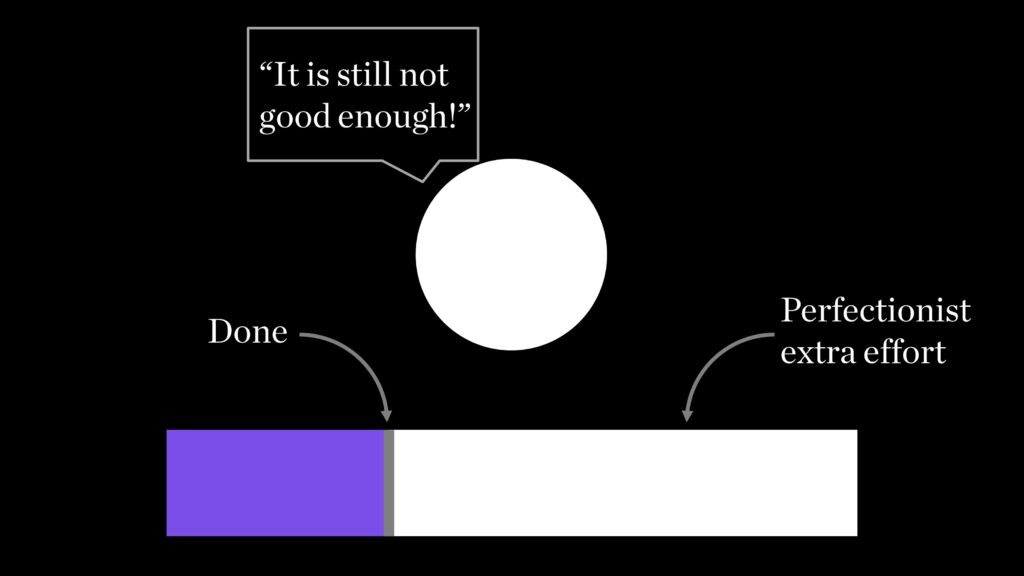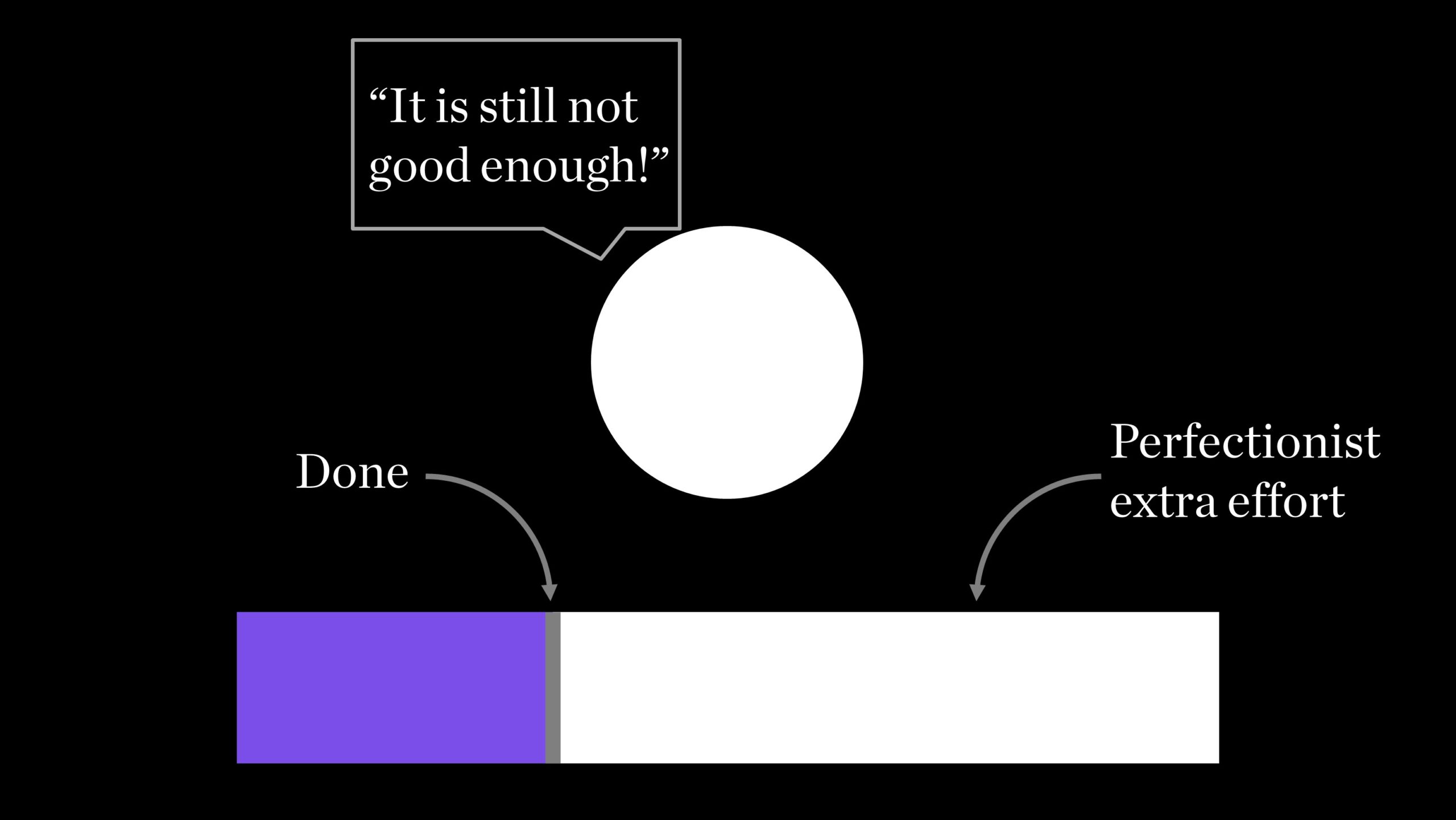Article last updated on November 19, 2023
Perfectionists often struggle with procrastination, anxiety, and low self-esteem. They tend to compare themselves to others or their ideal selves, and they believe that they should always strive to achieve perfection.

You don’t have to live in constant fear of failing. If you are striving to be better than the average person, then you will fail more often than not.
But if you focus on being your best, on doing what is right, on making a difference, on helping people, then all these setbacks are just bumps along the road.
When you make mistakes, learn from them, and keep moving forward, you will get there. You may never reach perfection, but you can find happiness.
I remember when I wanted to stop feeling like I was living in chaos. I took a step back and looked at why I think I live in chaos. It was a constant battle to be just a bit better and hide my progress from everyone else. I had to let go of this habit because it was not serving me.
That habit was being a perfectionist. And by letting go of it, I started seeing things differently. I realized what the opposite of perfectionism is, and now I want to share it with you.
The Opposite of Perfection
Perfectionism is the belief that we should always strive for something perfect. We should try our hardest to do everything perfectly. We should be able to accomplish anything without any flaws.
This is a perfect cover-up to hide behind “it is not perfect” and “I am not perfect.” It’s also a way to avoid taking responsibility for our actions.
On top of all of that, it blocks us from exposing ourselves and our work to feedback. Feedback is essential to improving. Without feedback, how would we know where we need to improve?

The opposite of perfectionism is acceptance. Acceptance means accepting yourself for who you are right now. You have to stop comparing your life to someone else’s. You stop trying to be perfect. You start accepting your imperfections.
And the same goes for your work. For example, you can’t force yourself to produce great content. You can’t force your audience to love you. You can’t force other people to say, “Your content is perfect.”
The only thing you can do is show up. Show what you know, show your work, and work on new iterations of your work. That’s what leads to acceptance.
When you accept yourself and are OK with showing your work to the world, regardless of whether you think it is perfect or not, then you will start feeling good about yourself. You will feel confident and comfortable enough to take risks.
The most common dimension of perfectionism is self-oriented perfectionism. Self-oriented perfectionism means that you focus on how you are doing compared to other people.
Self-oriented perfectionists tend to compare themselves to their peers. They compare themselves to their friends, family members, co-workers, and even strangers.
This especially happens when we don’t have clearly defined personal standards and deeply embodied patterns that lead to perfectionism.
Patterns of perfectionism
If you are struggling with perfectionism and it is hard to accept the fact that you don’t have to be perfect, here are some patterns I’ve noticed.
1. Overthinking

Every time you come across an idea, you immediately think about whether it is going to work out or not.
You might overthink whether you are going to succeed or not. You might even worry about whether you are going crazy. Overthinking is a form of procrastination.
2. Avoiding
You might avoid asking other people questions because you don’t want to appear stupid.Or you might avoid asking for help because you don’t want others to judge you.
3. Being afraid of making mistakes
When you are afraid of making mistakes, you think that you have to make sure that your work is flawless before you release it into the wild.
4. Always wanting to be better
When you compare yourself to others, you will always want to be like them. You constantly compare yourself to other people in order to see which one has done more than you.
5. Trying to control everything

Trying to control everything is a shortcut to a constant flow of negativity and anxiety. When you try to control the weather, the traffic, or the mood of your partner, you just end up frustrated.
Trying to control is controlling. Controlling is limiting. Limiting is holding back. Holding back is blocking. Blocking is hiding. Hiding is lying. Lying is covering up. Covering up is avoiding it. Avoiding is perfectionism.
6. Not liking yourself
Another form of perfectionism is not liking yourself. If you don’t like yourself, you won’t like anyone else either. Usually, when we don’t like ourselves, it’s because we are judging ourselves harshly. We are thinking negative thoughts about ourselves.
8. Obsessing about the future
Thinking about what could go wrong and worrying about things that haven’t happened yet doesn’t lead anywhere. They are simply forms of procrastination. Worrying doesn’t change anything. It doesn’t solve any problems.
These were just some of the main differences in perfectionism I’ve seen. There are many more.
All of these patterns create a common feeling of anxiety and unneeded stress.
I don’t want you to fall into this, and there are traps you can easily get caught in.
Perfection traps
Because we now know that the opposite of perfectionism is acceptance, we must be aware of these traps. Here are some common ones.
1. Comparison Trap

The comparison trap is when you compare yourself to others. You compare your work to theirs. You compare your income to theirs. You compare how much time you spend working to theirs.
You end up comparing yourself to others instead of focusing on your own path.
It’s a trap because it makes you feel like you are not enough, that you don’t have what they do, and that you can never be as good as them.
Take a moment to objectively see the entire situation. Is it worth comparing yourself to others? Do you really want to be like them? Why? What does it matter?
You probably want to know about some aspects of their lives but not others. Maybe you want to be more successful, but you don’t want to sacrifice other activities you like.
If you are already comparing yourself to others, then at least you need to take an honest look at the actions you are taking versus those of others. Are you doing what you are supposed to be doing?
2. Fear Trap
The fear trap is when you constantly worry about whether you are going to succeed. It’s still unclear whether you’ll ever achieve your objectives. Whether you will ever be happy.
It is so easy to fall into this trap. We are afraid of failure. We are afraid of success. We are afraid of being judged. We are afraid of losing control.
We are afraid of everything. And that fear keeps us in a constant state of anxiety.
So we try to keep things under control by controlling others. By controlling our environment, by controlling our thoughts. But none of that works. Because it doesn’t give us any freedom. It just creates more stress.
So we create more rules. We will make more demands. We try to control everything.
But there is no way to control the future. There is no way to control what happens next week.
There is one thing we can control, though. Our attitude towards things and perfection is something we can change.
3. Self-Sabotage Trap

A self-sabotage trap is when you tell yourself that you aren’t worthy. When you tell yourself you are not capable.
This is where many people fail. They believe that they can’t do anything right. So they don’t even try.
Before they even start, they convince themselves that they won’t be able to do it because they are not good enough.
They don’t even get started because they don’t trust themselves. Do not fall into this trap.
4. Imposter Syndrome
Imposter syndrome is when you constantly doubt your abilities and believe you’re not smart enough to do what you want.
That you don’t deserve to be here. Or that you are not talented. And that everyone else is better than you.
The problem with imposter syndrome is that it’s always there. Even if you accomplish something great, even if you win a prize.
Even if you do all these things, you still feel like you are not deserving. Like, you are not good enough. It’s like you are not talented or smart enough.
It is related to the previously mentioned self-sabotage trap, and it goes hand in hand with perfectionism.
Conclusion
Perfectionism affects every aspect of our lives. From how we act in relationships to how we spend time on ourselves. Once we inverse the perception of our perfectionism, we free up so much energy because acceptance means letting go of guilt and shame.
And once we let go of guilt and shame, we have so much more freedom.
We can finally live without comparison. Without judgment. With confidence and the urge to actually share our contribution to the world.
Whenever you are in doubt and perhaps you catch yourself in a perfectionism loop, take a deep breath and remember that perfectionism does not exist; it is only our self-judgement.


